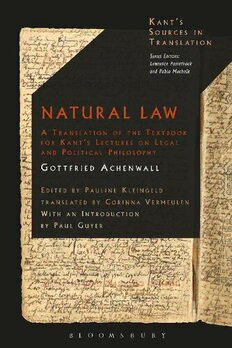
Natural Law: A Translation of the Textbook for Kant’s Lectures on Legal and Political Philosophy PDF
293 Pages·2020·3.871 MB·English
Most books are stored in the elastic cloud where traffic is expensive. For this reason, we have a limit on daily download.
Preview Natural Law: A Translation of the Textbook for Kant’s Lectures on Legal and Political Philosophy
Description:
As the first translation into any modern language of Achenwall’s Ius naturae, from the 1763 edition used by Immanuel Kant, this is an essential work for students and Kant scholars. For over twenty years, Kant used this book as the basis for his lectures on natural law. It has influenced his legal and political philosophy, as well as his ethics, and is indispensable for understanding Kant’s Feyerabend Lectures on Natural Law and his Metaphysics of Morals.Achenwall’s Ius naturae focuses on the fundamental principles of legal and political philosophy. It first discusses the natural rights and obligations pertaining to the relations of humans independently of their membership in particular communities, and then discusses those pertaining to the family, the state, and international relations.Articulating his theory with clear definitions, precise distinctions, and instructive comparisons with the work of Grotius, Hobbes, Pufendorf, Wolff, and others, Achenwall offers a lucid account that fits squarely in the natural law tradition. His handbook is of interest to scholars of natural law, social contract theory, and the history of political theory more generally.This is a complete English translation of both volumes of the 1763 edition. The volume also includes an Introduction by eminent Kant scholar Paul Guyer, comparing Achenwall’s theory to the legal and political philosophy of Kant’s Doctrine of Right. Moreover, the volume features a concordance correlating the Ius naturae to Kant’s Feyerabend Lectures on Natural Law.
See more
The list of books you might like
Most books are stored in the elastic cloud where traffic is expensive. For this reason, we have a limit on daily download.
